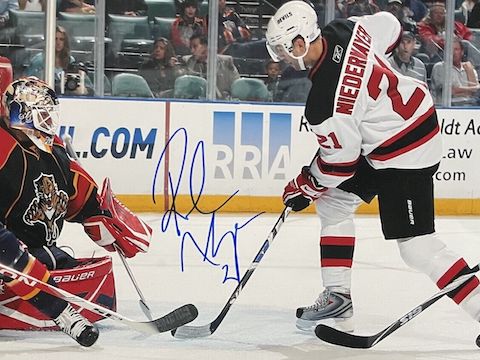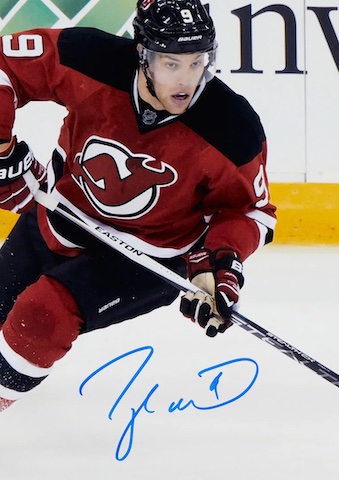
The New Jersey Devils began their NHL life in Kansas City as one of two 1974 expansion teams, the Scouts. The Scouts won just 20 games in their first two seasons, and won just once in the final 44 games in the 1975–76 season. Facing huge losses, the team’s owner sold to a group in Denver. The team played the next seven seasons as the Colorado Rockies.
New Jersey businessman Arthur Imperatore bought the club in 1978 hoping to move it to New Jersey, but the league blocked the move because a suitable arena did not exist. At the end of the 1981–82 season, Imperatore sold the Rockies to Garden State shipbuilding magnate John McMullen. McMullen moved the team into the Meadowlands for the 1982–83 and renamed it the Devils.
Prior to the 1987–88 season, the Devils hired Lou Lamoriello to build a winning franchise around the young players it had begun to acquire. Lamoriello was a longtime college coach with no pro experience. He applied the successful lessons he had learned, which went against NHL thinking: Create a culture and a system and find players whose talent fits the system.
In Lamoriello’s inaugural season as GM, the franchise had a winning record for the first time. On the final day of the season, New Jersey erased a 3–2 deficit against the Blackhawks and won 4–3 in overtime to clinch a spot in the playoffs. The victory triggered a magnificent playoff run, which ended one victory short of a trip to the Stanley Cup Finals.
In 1993–94, the Devils hired Jacques Lemaire as coach. A clever two-way center with the Canadiens, he installed a defensive system called the neutral zone trap. This system prevented fast-skating teams from initiating offensive plays, frustrating them unti they made costly errors. Just as important, it enabled the Devils to assemble a winning roster without depending on high-priced superstars. Lamoriello wanted a club with players who played for the name on the front of their sweaters, not on the back, and now he had it.

The Devils reached the 100-point plateau for the first time under Lemaire, but fell to the hated Rangers in the playoffs. The following year, 1994–95, New Jersey made it to the Stanley Cup Finals, where they swept the favored Red Wings in four straight. Goalie Martin Brodeur backstopped a defense that starred Scott Stevens, Ken Daneyko and Scott Niedermayer (left). The Devils’ scoring punch was supplied by Bobby Holik, Stephane Richer, John McLean, Neil Broten, Bill Guerin, Claude Lemieux and Jersey-born Jim Dowd. Lemieux won the Conn Smythe Trophy as MVP of the playoffs.
In 1999–00, the Devils were one of the best teams in the NHL during the first half, but began playing lackluster hockey in the second half. Having peaked early and flamed out in the playoffs several years in a row, Lamoriello replaced coach Robbie Ftorek with fromer Canadiens blueliner Larry Robinson in the final weeks and the Devils tore through the postseason. They defeated the defending champion Dallas Stars in the finals, with Stevens winning the Conn Smythe Trophy. Newcomers Jason Arnott, Patrik Elias and Scott Gomez were key contributors to the team’s second championship. Arnott scored the cup-winning goal in the second overtime of Game 6.
In 2000, John McMullen sold the Devils to the same company that owned the Yankees and Nets, which was controlled by the Steinbrenner family. The plan was to supply year-round sports content for the Yes Network and move the hockey and basketball teams to a new arena in downtown Newark. However, the company divested itself of the Devils before this happened.
Meanwhile, the Devils made a return trip to the Stanley Cup Finals in 2000–01. They held a 3 games to 2 lead over the Colorado Avalanche, but lost the series in seven games. The Devils won their third Stanley Cup in 2002–03, beating the Anaheim Mighty Ducks in seven games.
In 2004, Lehman Brothers executive Jeff Vanderbeek purchased a controlling interest in the Devils. He continued to leave the team in Lamoriello’s capable hands. In 2005–06, Brian Gionta set a new franchise record with 48 goals, the last one coming during the Devils’ 11th straight victory to close the season.
The team moved to Newark after the Prudential Center was completed early in the 2007–08 season. Using the ageless Brodeur and the veteran Elias as linchpins, the team rebuilt itself around dynamic forwards Ilya Kovalchuk, Zack Parise, David Clarkson and Adam Henrique. The Devils returned to the Stanley Cup Finals in 2012. The Los Angeles Kings won the first three games, but the Devils battled back to win the next two. LA took game 6 to deny New Jersey its fourth championship.
During the summer of 2013, Vanderbeek sold the Devils to Josh Harris and David Blitzer, who also owned the Philadelphia 76ers basketball team. The Prudential Center was part of the package. Scott O’Neil, who ran Madison Square Garden for many years, was installed as CEO of the Devils and the arena, while simultaneously holding the same job with the 76ers. As always, the day-to-day operations were left in Lamoriello’s hands.
In the years that followed, the Devils had more losing years than winning ones. Lamoriello left in 2015 for a job in Toronto and several rebuilding years produced some excellent players—including 2017–18 NHL MVP Taylor Hall—but the old magic never quite returned. That year the Devils made the playoffs but fell to the Tampa Bay Lightning in the opening round.
NHL All-Stars

Martin Brodeur 1st Team 2003, 2004 & 2007
Martin Brodeur 2nd Team 1997, 1998, 2006 & 2008
Patrik Elias 1st Team 2001
Taylor Hall 1st Team 2018 (right)
Ilya Kovalchuk 1st Team 2012
Scott Niedermayer 1st Team 2004
Scott Niedermayer 2nd Team 1992 & 1998
Zach Parise 2nd Team 2009
Scott Stevens 2nd Team 1997 & 2001
NHL Award Winners
Taylor Hall Hart Trophy 2018
Martin Brodeur Calder Trophy 1994
Scott Gomez Calder Trophy 2000
Claude Lemieux Conn Smythe Trophy 1995
Scott Stevens Conn Smythe Trophy 2000
Scott Niedermayer Norris Trophy 2004
Martin Brodeur Vezina Trophy 2003, 2004, 2007 & 2008